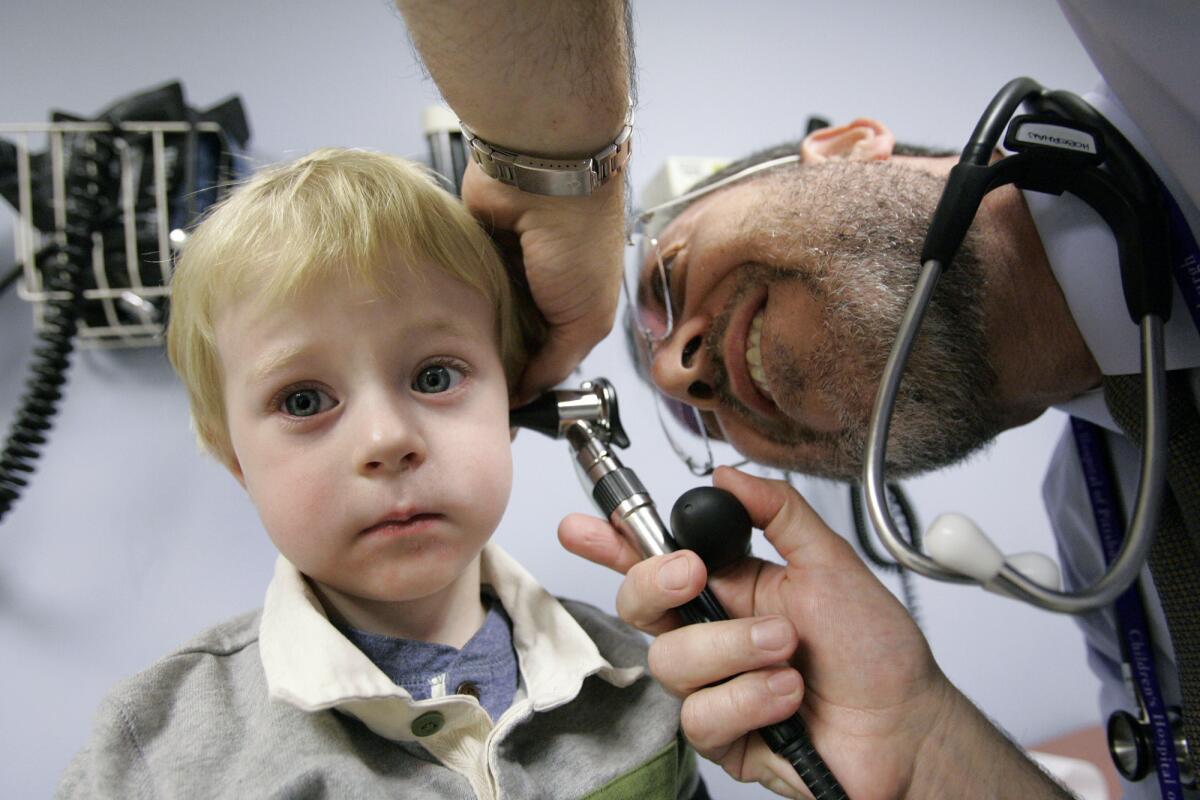House moves to boost research funding, loosen regulation

Giancario Gemignani–Hernandez is examined at Children’s Hospital of Pittsburgh, where a team of researchers undertook an NIH–funded study of how best to treat children with ear infections.
- Share via
Reporting from Washington — The House of Representatives overwhelmingly approved legislation Friday to speed approval of drugs and medical devices and boost funding for medical research, pushing forward a major overhaul of the federal government’s regulation of key parts of the healthcare system.
The legislation, which is backed by major industry groups as well as some leading patient advocates, drew unusually bipartisan support.
The bill passed 344-77, as 170 Republicans and 174 Democrats voted for it, brushing aside warnings from consumer watchdog groups that loosening oversight of prescription drugs and medical devices could harm patients.
The bill awaits action by the Senate, where lawmakers are crafting their own legislation, expected later this year.
The House bill, titled the 21st Century Cures Act, has been driven by House Energy and Commerce Committee Chairman Fred Upton (R-Mich.), who has billed it as vital to giving patients quicker access to lifesaving treatments.
“The history of health innovation is indeed remarkable,” Upton said on the House floor. “This bill is about making sure our laws, regulations and resources keep pace with scientific advances.”
A centerpiece of the bill is $8.75 billion in new funding for the National Institutes of Health at a time when the agency’s research budget has been flat for more than a decade.
That has helped draw Democratic support, even at a time when the two parties are headed toward a major showdown over broader government spending.
The new research money also rallied the American Heart Assn., American Cancer Society Cancer Action Network and other medical groups.
Provisions in the legislation that would change the way the Food and Drug Administration reviews drugs and devices are more controversial.
The bill, for example, would loosen regulatory oversight of changes device makers make to previously approved devices, a process that is already under fire following the deaths of patients in Los Angeles and elsewhere who contracted deadly infections from scopes that were not properly cleaned.
Public safety activists also worry the legislation could allow new drugs to be approved based on less rigorous trials.
“We should be clear this is a deregulatory bill that has some funding in it to win votes,” said Vijay Das, a policy advocate at Public Citizen.
Even some supporters have raised questions about the regulatory changes.
“It is our hope that any final legislation would not inappropriately lower evidentiary standards required for drug and device approval,” Dr. Elliott Antman, immediate past president of the American Heart Assn., warned in letter to lawmakers last month.
Also drawing criticism is a section of the bill that would loosen disclosure requirements on drug and device makers, which currently must publicly report payments and other gifts they make to physicians under a section of the 2010 Affordable Care Act.
The White House this week offered qualified support for the bill while registering concerns with several parts of the legislation, including its funding.
The additional research money would be largely paid for by selling millions of barrels of the federal government’s strategic petroleum reserve.
Another provision of the legislation that would give pharmaceutical companies an additional six months of patent protection on some drugs used for rare diseases would cost taxpayers $869 million over the next decade, according to the nonpartisan Congressional Budget Office.
Still another part of the bill that would allow hospitals to bill the government for using new, costlier antibiotics would cost more than $500 million.
Twitter: @noamlevey
More to Read
Sign up for Essential California
The most important California stories and recommendations in your inbox every morning.
You may occasionally receive promotional content from the Los Angeles Times.














